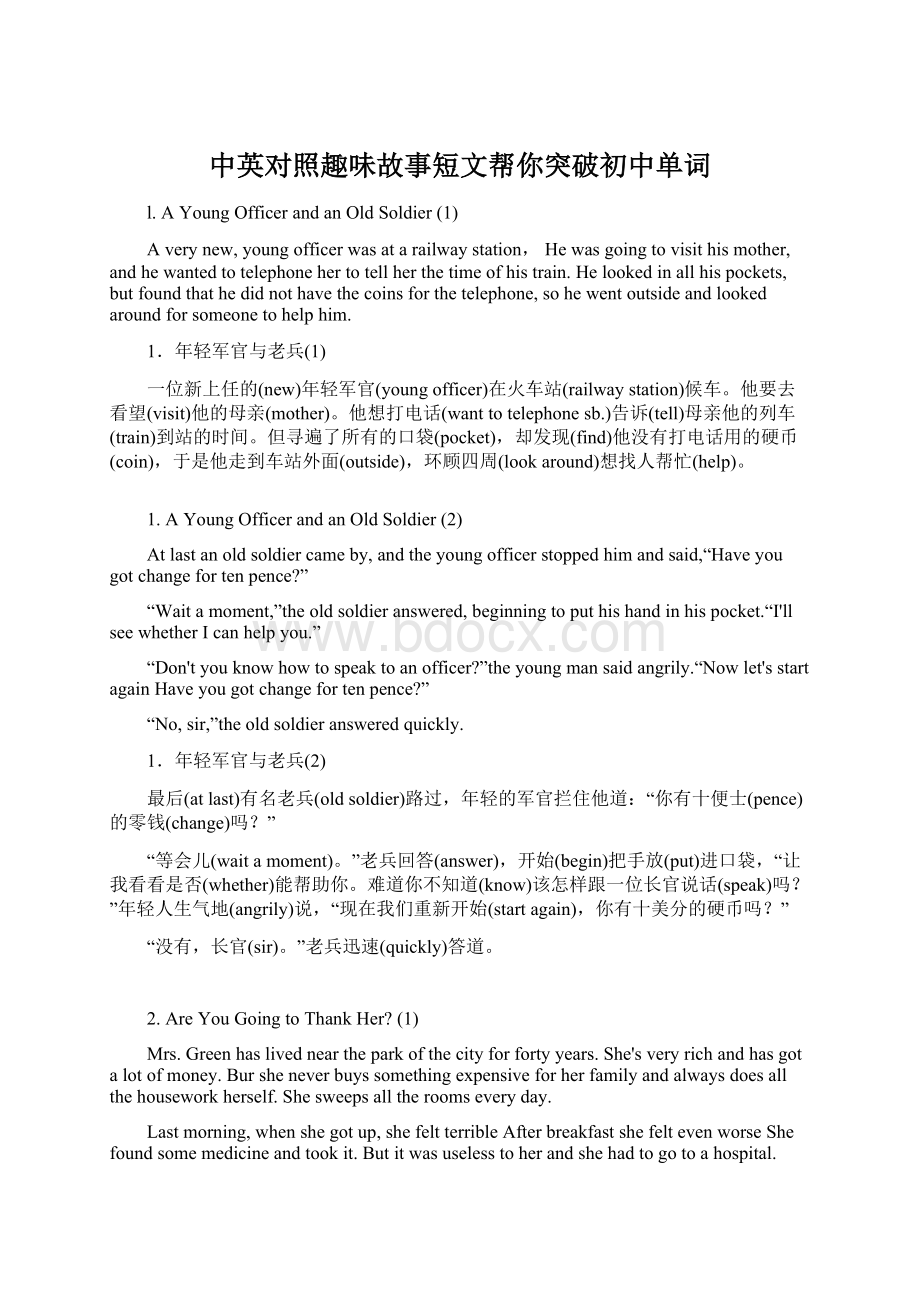中英对照趣味故事短文帮你突破初中单词.docx
《中英对照趣味故事短文帮你突破初中单词.docx》由会员分享,可在线阅读,更多相关《中英对照趣味故事短文帮你突破初中单词.docx(42页珍藏版)》请在冰豆网上搜索。

中英对照趣味故事短文帮你突破初中单词
l.AYoungOfficerandanOldSoldier
(1)
Averynew,youngofficerwasatarailwaystation,Hewasgoingtovisithismother,andhewantedtotelephonehertotellherthetimeofhistrain.Helookedinallhispockets,butfoundthathedidnothavethecoinsforthetelephone,sohewentoutsideandlookedaroundforsomeonetohelphim.
1.年轻军官与老兵
(1)
一位新上任的(new)年轻军官(youngofficer)在火车站(railwaystation)候车。
他要去看望(visit)他的母亲(mother)。
他想打电话(wanttotelephonesb.)告诉(tell)母亲他的列车(train)到站的时间。
但寻遍了所有的口袋(pocket),却发现(find)他没有打电话用的硬币(coin),于是他走到车站外面(outside),环顾四周(lookaround)想找人帮忙(help)。
1.AYoungOfficerandanOldSoldier
(2)
Atlastanoldsoldiercameby,andtheyoungofficerstoppedhimandsaid,“Haveyougotchangefortenpence?
”
“Waitamoment,”theoldsoldieranswered,beginningtoputhishandinhispocket.“I'llseewhetherIcanhelpyou.”
“Don'tyouknowhowtospeaktoanofficer?
”theyoungmansaidangrily.“Nowlet'sstartagainHaveyougotchangefortenpence?
”
“No,sir,”theoldsoldieransweredquickly.
1.年轻军官与老兵
(2)
最后(atlast)有名老兵(oldsoldier)路过,年轻的军官拦住他道:
“你有十便士(pence)的零钱(change)吗?
”
“等会儿(waitamoment)。
”老兵回答(answer),开始(begin)把手放(put)进口袋,“让我看看是否(whether)能帮助你。
难道你不知道(know)该怎样跟一位长官说话(speak)吗?
”年轻人生气地(angrily)说,“现在我们重新开始(startagain),你有十美分的硬币吗?
”
“没有,长官(sir)。
”老兵迅速(quickly)答道。
2.AreYouGoingtoThankHer?
(1)
Mrs.Greenhaslivedneartheparkofthecityforfortyyears.She'sveryrichandhasgotalotofmoney.Bursheneverbuyssomethingexpensiveforherfamilyandalwaysdoesallthehouseworkherself.Shesweepsalltheroomseveryday.
Lastmorning,whenshegotup,shefeltterribleAfterbreakfastshefeltevenworseShefoundsomemedicineandtookit.Butitwasuselesstoherandshehadtogotoahospital.
2.您是要感谢她吗?
(1)
格林夫人(Mrs.)在这座城市(city)的公园(park)附近住(live)了四十(forty)年了。
她特别富裕(rich),相当有钱(money)。
但她从不(never)给自己的家人(family)买昂贵的(expensive)物品,而且总是(always)自己做所有的家务(housework),她每天打扫(sweep)所有的房间。
昨天早上(Lastmorning)。
她起床(getup)时感觉(feel)很糟糕(terrible)。
早餐(breakfast)后她觉得更严重(evenworse),就找了一些药(medicine)吃了。
但还是没用(useless)。
她不得不去了医院(hospital)。
2.AreYouGoingtoThankHer?
(2)
Thedoctorlookedheroverandaskedhertobeinhospital,butsherefusedandwenthomeonfoot.Assoonasshegothome,thetelephonerang.Shehurriedtoanswerit.Itwasthedoctor.Hetoldhershehadleftherpurseinthehospitalandanursehadfoundit.
“Couldyoutellmehername,please?
”askedMrs.Green.
“Ofcourse,Mrs.Green.Areyougoingtothankher?
”askedthedoctor.
“No,no.”Shesaid,“Myhandbagwaslostthreeyearsago.Iwanttoknowifshefoundit.”
2.您是要感谢她吗?
(2)
医生(doctor)给她作了检查并要求(ask)她住院,但她拒绝(refuse)了,然后步行(onfoot)回家。
她一(assoonas)到家,电话就响(ring)了,她赶紧(hurry)去接听电话,是医生打来的,他告诉这位女士她的钱包(purse)丢在了医院,一位护士(nurse)捡到了。
“您能告诉我这位护士的名字(name)吗?
”格林夫人问道。
“当然可以(ofcourse),格林夫人,您是要感谢(thank)她吗?
”医生问道。
“不,不是,”她说:
“我的手提包(handbag)三年前(threeyearsago)丢了,我想问问是不是她检到了。
”
3.SamandTod
(1)
Samhadadog.ItsnamewasTod.Itwasveryhelpful,butitatetoomuch.SoSamdidn'tlikeit,andhewantedtokillTod,HetiedTodinabagandputitinasmallboat.Herowedtheboattothemiddleofabigriver.Justashethrewthepooranimalintotheriver,theboatbegantogodown.BothSamandTodfellintotheriver.
3.萨姆与托德
(1)
萨姆有一只狗(dog)。
他的名字叫托德。
它很有用(helpful),但它吃的太多(eattoomuch)。
所以萨姆不喜欢他。
萨姆想杀死(kill)托德。
萨姆把托德绑(tie)在一个袋子里,把它放进一只小船(smallboat)。
他把船划(row)到一条大河(river)的中央(middle)。
他正要(just)把这只可怜的动物(pooranimal)扔(throw)下河的时候,船开始下沉,萨姆和托德两个都(both)跌入(fallinto)河里。
3.SamandTod
(2)
Todwasabletoswim,butSamcouldn'tThedogbit(咬)theropeandgotoutofthebag.IttrieditsbesttoswimtosaveSamThemanwassaved,sohewasverythankfultothedog.Hedidnotwanttokillthedoganymore.Fromthenon,hegavethedogasmuchfoodasitwanted.
3.萨姆与托德
(2)
托德能(beableto)游泳(swim),但萨姆不会。
狗把绳子(rope)咬断,从袋子里出来(getoutofthebag)。
它竭尽全力(tryone'sbest)游过去救(save)萨姆。
萨姆获救了,所以他对托德是非常感激的(thankful).他不再(not…anymore)打算杀它了。
从那以后(fromthenon),小狗想要吃多少食物(food)萨姆就给多。
4.IntheBar
(1)
InEngland,ifyouareundertheageofeighteen,you'renotallowedtodrinkinapublicbar.
Mr.Thompsonusedtogotoabarnearhishouse,buthenevertookhisson,Tom,becausehewastooyoung.ThenwhenTomhadhiseighteenthbirthday,Mr.Thompsontookhimtohisusualbarforthefirsttime.
4.在酒吧
(1)
在英格兰(England),年龄在18岁以下(undertheageofeighteen)的人不允许(benotallowedtodo)到公众(public)酒吧里喝酒(drink)。
汤普森先生过去经常(usedto)到他家附近(near)的一个酒吧喝酒,但他从不带(take)他的儿子(son)汤姆,因为(because)他还太小(tooyoung)。
当汤姆过18岁生日(birthday)时,他第一次(forthefirsttime)带儿子去了他经常去的酒吧(hisusualbar)。
4.IntheBar
(2)
Theydrankforhalfanhour,andthenMr.Thompsonsaidtohisson,“Now,Tom,Iwanttoteachyoualesson,Youmustalwaysbecarefulnottodrinktoomuch.Andhowdoyouknowwhenyou'vehadenough?
Well,I'lltellyou.Doyouseethosetwolightsattheendofthebar?
Whentheyseemtohavebecomefour,you'vehadenoughandshouldgohome.”“But,Dad,”saidTom,“Icanonlyseeonelightattheendofthebar.”
4.在酒吧
(2)
喝了半个小时(halfanhour)后,汤普森对儿子说道,“汤姆,现在我给你上一课(teachyoualesson)。
你必须(must)要小心(becareful)决不要喝太多。
那怎样才能知道你是否已经喝够了(enough)呢?
听着,我告诉你。
你看见(see)酒吧尽头的(attheendof)那两盏灯(light)了吗?
当它们看起来(seem)已经变成(become)四盏的时候,你就喝足了,应该(should)回家(gohome)了。
”“可是,爸爸,”汤姆说,“我只(only)看见那儿有一盏灯呀!
”
5.ThreeBlackUmbrellas
(1)
Sallywasastudent.Itwasgoingtobehermother'sbirthday.Shewantedtobuyherapresentthatwouldbeniceandusefulbutnotexpensive
Aweekbeforehermother'sbirthday,shewentshoppingafteraquickandsimplelunch.Whenshehadbeenlookingforhalfanhour,shefoundashopthatwassellingcheapumbrellas,anddecidedtotakeablackone.Hermotherhadlosthersthemonthbefore.
5.三把黑伞
(1)
萨莉是个学生(student),再过几天就是她母亲的生日了,她想给母亲买(buy)一个价格不高,但漂亮、实用的(niceanduseful)礼物(present)。
在她母亲生日之前(before)的一个星期(week),萨莉匆忙地吃了顿简单的(simple)午餐(lunch)后就出去购物(goshopping)了。
看(look)了半个小时后,发现了一个卖(sell)便宜(cheap)雨伞(umbrella)的商店,她决定(decide)买把黑色的(black)伞。
一个月(month)之前她母亲把她的伞(hers)丢(lose)了。
5.ThreeBlackUmbrellas
(2)
Shethought,“Youcouldcarrythatwhenyouarewearingclothesofanycolor.”Soshedecidedtobuyalovelyblackumbrellaandtookitbacktotheschoolwithheruntilherclasseshadfinished.
Onherwayhomeinthetrainthateveningshefelthungrybecauseshehadsuchasmalllunchthatshewentalongtothebuffetcar(餐车)forasandwichandacupofcoffee.
5.三把黑伞
(2)
她想,“穿(wear)任何颜色(color)的衣服(clothes),都可以携带(carry)黑伞。
”于是她决定买把可爱的(lovely)黑伞带回学校(school),直到(until)课(class)结束(finish)时才带回家。
那天晚上(evening).在她乘火车回家的路上(onherwayhome),因为午餐吃的很少(havesuchasmalllunch).她觉得饿(hungry).于是走进餐车,要了一份三明治(sandwich)和一杯咖啡(acupofcoffee)。
告诉他们自己为妈妈买的伞不见了,而且下一站(nextstation)她就得下车了。
其他的(other)三位乘客听到(hear)后,都询问她母亲的地址(address),以便(sothat)有人知道拿错了(takeitbymistake)伞再拿回来(bringback)时,他们可以把伞寄(send)给她母亲。
在接下来的一周,萨莉收到她母亲的来信(hearfromhermother),上面写道,“非常感谢你送我的漂亮礼物,但你为什么寄给我三把相似的(similar)黑伞呢?
”
6.Friends
(1)
Friendsaredifferentthingstodifferentpeople.Tomylittlesister,afriendissomeonewholikestoswimandridebikes.Mymom'sideaofafriendissomeonelikeMrs.Smithwhowalksandtalkswithhereverymorning.Mydad'sfriendsareneighborswhohelphimwiththeworklikebuildingshelvesandplantingtrees.
6.朋友
(1)
对于不同的人(people),朋友(friend)意味着不同的(different)内容。
对于我的小妹妹(littlesister)来说,朋友是喜欢(like)游泳和骑自行车(ridebikes)的某个人(someone)。
我妈妈的想法(idea)是朋友像(like)史密斯夫人一样可以每天早上陪她散步(walk)并交谈(talk)。
我爸爸的朋友是帮他搭建架子(buildshelves)、种树(planttrees)或做其他活的邻居们(neighbors)。
6.Friends
(2)
Steve,ourmonitor,ismybestfriendWegoskating,playfootball,talkaboutsports,andgotoaconcert.WhenIbrokemyleg,healwayscameovertoplaygames;inschool,hecarriedmyschoolbagformeandgotmylunchforme.IknowIcanalwayscountonhim,andhealsoknowsthathecancountonme.
Somefriendsmaybeinyourlifeforawhile.Otherswillbethereforalongtime,maybeevenforever(永远).Iwouldhatetomove,unlessIcouldtakemyfriendswithmeTheyaretooimportanttoleavebehind.
6.朋友
(2)
我们的班长(monitor)史蒂夫是我最好的(best)朋友。
我们去滑冰(goskating)、踢足球(playfootball)、谈论体育(talkaboutsports)、去听音乐会(gotoaconcert)。
我摔断腿(leg)时,他就来我家玩游戏(game);在学校,他替我拿书包(schoolbag),并帮我打午饭。
我知道我总能依靠(counton)他,他也知道他能依靠我。
有些(some)朋友可能(may)只在你的一生中停留一会儿(forawhile)。
另一些(others)则很长一段时间(foralongtime)和你做朋友,甚至有可能(maybe)是终生的朋友。
我憎恨(hate)搬家(move),除非(unless)我可以把朋友也带走。
他们对我来说太重要了(tooimportant),我无法把他们留下(leavebehind)。
7.The“Deaf”Wife
Amanistalkingtothefamilydoctor.“Doctor,Idoubtwhethermywife'sgoingdeaf.”Thedoctoranswers,“Here’ssomethingyoucantryonhertotestherhearing.Standsomemetersawayfromherandaskheraquestion.Ifshedoesn'tanswer,movealittlecloserandaskagainKeeprepeatingthisuntilsheanswers.Thenyou'llbeabletotellifsheisdeafornot.”
Themangoeshomeandbeginstotesthiswife'shearing.Hestandsbythewallandsays,“Mydear,what'sfordinner?
”Hedoesn'thearananswer,sohemovesclosertoher.“Mydear,what'sfordinner?
”Stillnoanswer.Herepeatsthisseveraltimes,untilhe'sstandingjustafewfeetawayfromher.
Finally,sheanswers,“Fortheeleventhtime,Isaidwe'rehavingmeatandrice!
”
7.“耳聋的”妻子
某人对他的家庭医生说,“医生,我怀疑(doubt)我妻子(wife)要聋(deaf)了。
”医生回答说,“有个办法可以测试(test)她的听力。
你站(stand)在离她几米远(somemetersaway)的地方,然后问她一个问题(question)。
如果她不回答,你再走近点(alittlecloser),然后再问。
如此重复(repeat)直到她听到为止。
那时你就可以判断她是否聋了。
”
这人回家后便开始测试他妻子的听力。
他站在墙的旁边(bythewall)说,“亲爱的(dear),晚饭(dinner)吃什么?
”他没听到回答,于是又朝妻子走近了些。
“亲爱的,晚饭吃什么?
”仍然(still)没有回答。
他如此反复了几次(severaltimes).直到他离妻子只有几英尺(afewfeet)的地方。
最后(finally),她回答道,“我都说了十一次了,我说咱们要吃肉(meat)和米饭(rice)。
”
8.WeReallyDon'tKnow
(1)
Jackhadgon